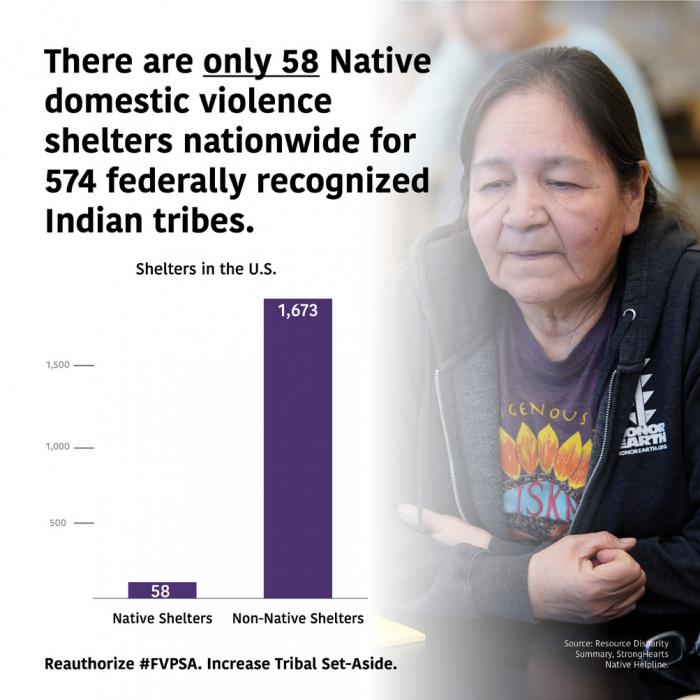Family Violence and Prevention Services Act 2021 Reauthorization

Paula Julian, Senior Policy Specialist, NIWRC.
Tribal Consultation Confirms Urgent Need to to Increase Funding for Shelter and Services
Authorization for the Family Violence Prevention and Services Act (FVPSA), the only federal grant program dedicated to domestic violence shelter and services, expired in 2015. As 2021 comes to an end, a final push is needed to bring the years of work to reauthorize FVPSA across the finish line.
FVPSA funding provides lifesaving support for Native domestic violence shelters, training and technical assistance centers, children’s services, emergency response hotlines, and so much more. Indian Tribes use FVPSA funds to provide help at the dangerous moment when a woman has left her abuser, often with children at her side, and needs safe shelter and services to begin a new life.
Indigenous women face some of the highest rates of domestic violence, yet there is a distinct gap in the culturally-based services available for Native women. For over two years, a coalition of national organizations worked closely with congressional champions to draft an enhanced version of a bill to reauthorize FVPSA in 2021. The Tribal enhancements agreed upon by the national coalition were discussed and have the strong support of Tribal leaders.
Tribal Leaders Call for FVPSA 2021 Reauthorization
On September 8-9, 2021, HHS held a Tribal consultation on FVPSA. Tribal leaders provided clear statements during the consultation on the need for the Tribal enhancements in the FVPSA reauthorization bills and other concerns.
Call to Support FVPSA Reauthorization
(H.R. 2119, S. 1275)
“FVPSA is an important piece of legislation, which supports AI/AN women and children in Indian Country, yet the law today remains unauthorized. Tribal Nations and Tribal organizations have worked with our allies for several years to craft meaningful FVPSA reauthorization language with key Tribal improvements. Today those key Tribal improvements can be found in the Family Violence Prevention and Services Improvement Act of 2021, H.R. 2119 and S. 1275. DHHS and FYSB should fully support both bills, which include the following Tribal improvements:
- Increasing the Tribal Nation formula set aside from the current statutory 10% allocation to a 12.5% allocation;
- Providing funding for nonprofit Tribal coalitions;
- Codifying a National Indian Domestic Violence Hotline; and
- Codifying an Alaska Native Tribal Resource Center on Domestic Violence.
All of these improvements are supported by Tribal Nations and the NCAI Task Force, including a 2014 NCAI resolution and should be supported by DHHS and FYSB. The NCAI Task Force also calls on Congress to pass the Family Violence Prevention and Services Improvement Act of 2021 as soon as possible.”—Juana Majel-Dixon, Traditional councilmember for the Pauma Band of Luiseño Indians, Secretary for NCAI, and a co-chair of the NCAI Task Force on Violence Against Women.

Call to Support Tribal Nations’ Population Data Preference
“FYSB currently uses federal data (U.S. Census Data and the Bureau of Indian Affairs Population and Labor Force Report) over Tribal Nation data to determine Tribal population size when distributing FVPSA funding. FYSB should immediately change this policy and defer to each Tribal Nation’s data preference for purposes of FVPSA funding. While some Tribal Nations may prefer to use U.S. Census or BIA data, others may prefer to use the Tribal Nations’ own data to properly showcase the need in their communities. Many Tribal Nations have shown that federal data often undercounts Tribal populations, and the lack of accurate data currently impacts the distribution of FVPSA funding to Indian Country.”—Shannon Holsey, President of the Stockbridge-Munsee Band of Mohican Indians, Treasurer of NCAI, and a co-chair of the NCAI Task Force on Violence Against Women.
Call for Annual Consultation on Implementation and Administration of FVPSA
"In consultation with Tribal Nations, the Family and Youth Services Bureau (FYSB) should develop and publish a consultation policy for an annual consultation on the implementation of FVPSA, including the administration of Tribal funds, and increasing and strengthening the response to domestic violence in Indian Country.
The annual FVPSA consultation policy should fulfill the requirement of meaningful consultation by providing Tribal Nations with more than the current Department of Health and Human Services (DHHS) policy of 30 days notice. The new FVPSA consultation policy should include the 120 days notice, which Tribal Nations have called for in past VAW Tribal consultations. The 120 days notice of a government-to-government FVPSA Tribal consultation will allow for fully informed engagement in the consultation process.”—Juana Majel-Dixon
Call for Additional Information Concerning Proposed Minimum Grant
“The NCAI Task Force will defer to Tribal leaders to answer FYSB’s formula question. However, FYSB should provide a chart showing Tribal awards using at least three base amounts, including $55,000, $100,000, and $150,000. This funding chart will help Tribal Nations better understand the impacts and possibilities under FYSB’s proposed formula. After the chart is distributed to Tribal Nations, the NCAI Task Force recommends that FYSB consults with Tribal Nations again to provide the opportunity for additional feedback.”—Shannon Holsey
Call for Increased Funding for Tribal Domestic Violence Shelters
“The less than 60 Native shelters and less than 300 Tribal programs addressing violence against women cannot be the markers for providing women with the comprehensive assistance they need. NCAI’s 2003 resolution calling for a federal grant program to build shelters and transitional housing remains an outstanding need for which we call on the federal government to support. These shelters offer not solely bed space but can be the difference between a Native woman going missing and being murdered. They offer the immediate and long-term support a woman and her children need. If we want to prevent MMIW and stop further trauma of our children and grandchildren, Native women and their children need shelters, housing and the range of crisis and long-term supportive services that advocates and shelters provide. We call on HHS, DOJ, and other federal agencies to support the Tribal enhancements in the reauthorization of FVPSA including the increase in FVPSA Tribal resources, including the Tribal set aside increase from 10% to 12.5% of total appropriations, funding for a dedicated national Indian domestic violence hotline and a separate set aside for Tribal coalitions. We also ask for other federal agencies to share what resources they have available that could possibly assist with shelters and supportive services.”—Michael Williams, Sr., Chief of the Akiak Native Community, a Yup’iit Village in Alaska
Less Than Half of Federally Recognized Tribes Receive FVPSA Funding
While all federally recognized Indian Tribes are eligible to apply for FVPSA funding, unfortunately the current funding level prevents funding for all Tribes. We applaud the FVPSA office for funding over 250 Tribes and Tribal organizations, yet this number must increase. Currently fewer than half of all federally recognized Tribes receive FVPSA funding.
Given the increased grassroots and governmental support to address the injustice of Missing and Murdered Indigenous women (MMIW), we are long overdue for the Tribal enhancements proposed in the FVPSA 2021 reauthorization. These amendments will ensure that women have the shelter and supportive services they need to prevent abductions and homicides.




